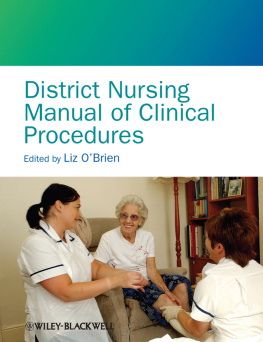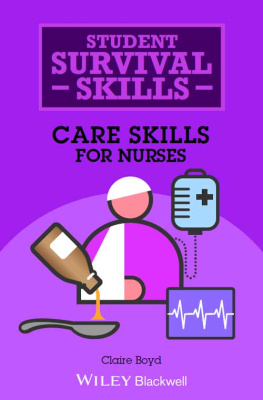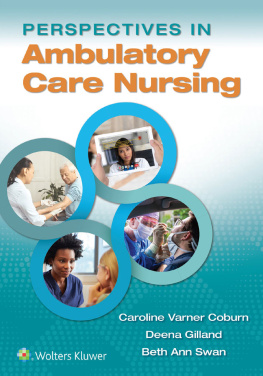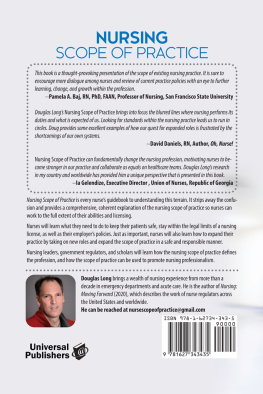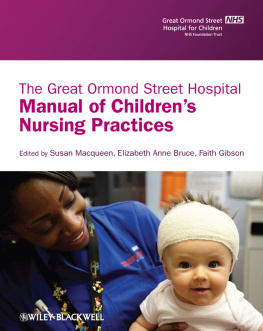Blackwell Publishing was acquired by John Wiley & Sons in February 2007. Blackwells publishing program has been merged with Wileys global Scientific, Technical and Medical business to form Wiley-Blackwell.
For details of our global editorial offices, for customer services and for information about how to apply for permission to reuse the copyright material in this book please see our website at www.wiley.com/wiley-blackwell.
The right of the author to be identified as the author of this work has been asserted in accordance with the UK Copyright, Designs and Patents Act 1988.
All rights reserved. No part of this publication may be reproduced, stored in a retrieval system, or transmitted, in any form or by any means, electronic, mechanical, photocopying, recording or otherwise, except as permitted by the UK Copyright, Designs and Patents Act 1988, without the prior permission of the publisher.
Designations used by companies to distinguish their products are often claimed as trademarks. All brand names and product names used in this book are trade names, service marks, trademarks or registered trademarks of their respective owners. The publisher is not associated with any product or vendor mentioned in this book. This publication is designed to provide accurate and authoritative information in regard to the subject matter covered. It is sold on the understanding that the publisher is not engaged in rendering professional services. If professional advice or other expert assistance is required, the services of a competent professional should be sought.
District nursing manual of clinical procedures / edited by Liz OBrien.
p. ; cm.
Includes bibliographical references and index.
ISBN 978-1-4051-1459-2 (pbk. : alk. paper)
I. OBrien, Liz, 1962
[DNLM: 1. Nursing Care. 2. Nursing Process. WY 100.1]
A catalogue record for this book is available from the British Library.
Wiley also publishes its books in a variety of electronic formats. Some content that appears in print may not be available in electronic books.
Every effort has been made in the writing of this book to present accurate and up-to-date information from the best and most reliable sources. However, the results of caring for individuals depends upon a variety of factors not under the control of the authors or the publishers of this book. Therefore, neither the authors nor the publishers assume responsibility for, nor make any warranty with respect to, the outcomes achieved from the procedures described herein.
Contributors
Edited by
Liz OBrien, RN, BSc (Hons) Specialist Practice District Nursing, BSc (Hons), DPSN, FETC
Service Manager for Community Nursing, Surrey
(CHAPTERS 1, 4, 8, 9, 10, 11, 12, 13 and 15)
Contributors
Maureen Benbow, MSc, BA, RGN, HERC
Senior Lecturer, University of Chester
(CHAPTER 15)
Elissa Bradshaw, RN, BSc
Clinical Nurse Specialist/Biofeedback, St Marks Hospital
(CHAPTER 3)
Jennie Burch RN (Adult), MSc, BSc (Hons)
Enhanced Recovery Nurse Facilitator, St Marks Hospital
(CHAPTER 3)
Brigitte Collins, RN, BSc (Hons), MSc GI Nursing
Lead Nurse, Biofeedback Therapy, St Marks Hospital
(CHAPTER 3)
Jackie Daly, RGN, RMN, DN CERT
Continuing Care Nurse Assessor, Croydon Borough Team, NHS South West London
(CHAPTER 4)
Lisa Dougherty OBE, RN, MSc, DClinP
Nurse Consultant Intravenous Therapy, The Royal Marsden Hospital NHS Foundation Trust
(CHAPTER 14)
Patricia Evans, MCSP, Grad Dip Phys
Clinical Physiotherapist/Specialist Biofeedback, St Marks Hospital
(CHAPTER 3)
Rachel Gilbert, RN, BSc (Hons), PG Dip Public Health
Senior Lecturer, University of the West of England
(CHAPTER 11)
Sarah Hart, RN
Formerly Clinical Nurse Specialist, Infection Control
The Royal Marsden Hospital NHS Foundation Trust London
(CHAPTER 6)
Jill Kayley, MSc RN DN Certificate
Independent Nurse Consultant Community IV Therapy
(CHAPTER 7)
Rosie Lake, RGN, RCNT, Dip Nursing (Part A), ENB A97
Lead Back Care Adviser, Portsmouth Hospitals NHS Trust, Queen Alexandra Hospital
(CHAPTER 9)
Rachel B Leaver, MSc, BSc (Hons), PGCE, RN
Lecturer Practitioner Urological Care, University College London Hospitals and London South Bank University
(CHAPTER 13)
Kathy Martyn, MSc Nutriton BSc (Hons) Biological Sciences, BEd. (Hons), PGDpN SRN
Principal Lecturer, Nutrition, INAM University of Brighton
(CHAPTER 10)
Lesley Maskell, MSc, PGCEA, RGN, DN
Independent Learning and Development Advisor
(CHAPTER 1)
Amanda Mayo, MSc, BSC, RGN, NiP
111 Lead London
Harmoni
(CHAPTER 8)
Eleanor McGill, RN, D/Nurse Cert, Dip Nursing
Community Liaison Nurse, Croydon Health Services NHS Trust
(CHAPTER 4)
Chrissie Nicholls RGN
Practice Nurse, Croydon, Surrey
(CHAPTER 5)
Pam Phipps, RGN, C&G 7307, ENB A97
Back Care Adviser, Portsmouth Hospital NHS Trust, Queen Alexandra Hospital
(CHAPTER 9)
Marilyn Prentice
Former diabetes specialist nurse
Croydon Health Services NHS Trust
(CHAPTER 2)
Jo Robinson, EN, RGN, DN, Diploma Nursing (Palliative Care), BSc (Hons)
Community Nursing; PGcert Clinical Governance; MSc Health Science Clinical Service Manager, Community Nursing Services East Solent NHS Trust.The Turner Centre, St James Hospital
(CHAPTER 9)
Heather Short, MEd, BSc (Hons), PGCE, Dip/DN, RGN
Senior Lecturer, University of the West of England
(CHAPTER 11)
Anne Spence, RN, DN, SPT, BSc (Hons)
Clinical Nurse Specialist in Palliative Care, St Christophers Hospice
(CHAPTER 12)
Greta Thornbory, TD, MSc OH RGN SCPHNOH DipN OH PGCEA
Self-employed Occupational Health and Education Consultant
Fran Williams, RN, BSc, MA
Consultant Practitioner Safeguarding Adults, Solent NHS Trust, The Turner Centre, St James Hospital
(CHAPTER 9)
Sue Woodward RGN, MSc, PGCEA
Lecturer, Florence Nightingale School of Nursing and Midwifery, Kings College London
(CHAPTER 3)
Keri Wright, RN, DN, DipHE, BSc (Hons), MA
Senior Lecturer, School of Health and Social Care, University of Greenwich
(CHAPTER 1)
Foreword
The home is a special place for nursing.
It is special for the person receiving care, because it is their environment, and, unlike in hospital, they are in control. Inviting a health professional into their home is an act of trust for the individual. They trust that they will not be judged on the basis of their environment, their style of living or their family. In hospital, they are a patient, and with the best will in the world, ward staff can only know the patient to a superficial degree, based on what he or she chooses to tell them or show them. At home, the individual can only be themselves, and the nurses who treat them there see them as they are.
Home is also a special place for the nurse to practice. Community nurses are privileged to be invited into peoples lives and homes. They have to be adaptable, professional, inventive and highly-skilled to deliver complex care in these very diverse environments. And the demands on their skills are growing all the time. Technology, demographics, economics and patient choice are all increasing the pressure to keep people at home rather than in hospital, no matter how serious, complex or unstable their condition.

